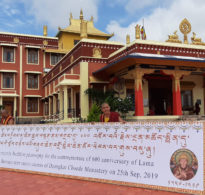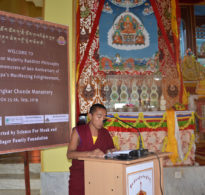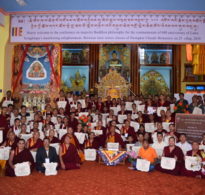2-Day Conference at Dzongkar Choede Main Temple
(September 25 to 26, 2019)
The two-day conference was the first large conference / dialogue organized by the monastery. All of the speakers were in-house, monks at the monastery. The twenty speakers were Buddhist philosophy students and scholars, 16 to 30 years old. Most were in their mid-20s. The entire monastery attended, over 250 monks, except for the youngest kids under 8 years old.
Lama Tsongkapa’s biography framed the conference. The conference presentations were developed in a novel and participatory structure. Two months of preparation and group work supported the conference, and supported new ways of learning Buddhism together. Twenty groups, of about 10 people per group, worked together to develop a paper. Each group covered a portion of Tsongkapa’s life and also covered related philosophical concepts.
Nearly the entire monastery was involved in the preparation. After debate class in the evening they met with their group, sometimes they met on days off. Each group identified one person from their group to deliver the 10 minute presentation and be the first responder for the 10 minute question and answer period that followed. The dialogue included conversations about science, especially during the Q&A period.
The project team after the conference reflected that teamwork and writing were a notable and important part of developing the conference. They also offered the idea that the conference was successful at strengthening education at their monastery. The monasteries administration said that they were writing to the office of the Dalai Lama and the Department of Religion to inform them of their successful program. The project team suggested that next year (2020) they would like to organize a conference around the book by the Dalai Lama, “The Universe in a Single Atom,” so monks have a better understanding of how Buddhist and scientific points of view intersect, where they meet. The project team also shared that their project was a new way to study and learn (through group work) that is not common in the monastery. They felt this was very successful, that the monks learned new skills for analyzing, and new skills on communicating their knowledge to audiences, and they became more self-motivated.



